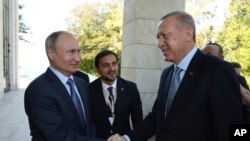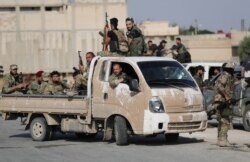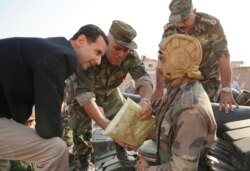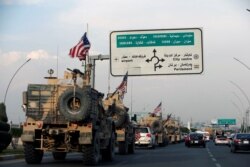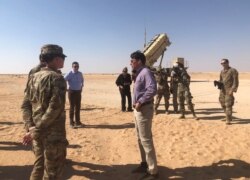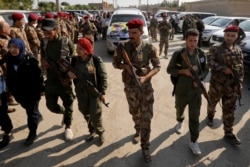Turkish President Recep Tayyip Erdogan met Tuesday with Russian President Vladimir Putin to plot military strategy along Turkey's Syrian border, with Erdogan vowing to resume his offensive against Kurdish fighters if they do not leave the region before a cease-fire expires in hours.
Erdogan said as many as 800 Kurdish fighters have left the border area just south of Turkey, but that about 1,300 remain.
The Turkish leader said that if the United States, with which he brokered a five-day cease-fire last week, does not live up to its promises to push for the departure of the Kurdish fighters, "We will continue our operation from where we left off with greater determination." The cease-fire expires at 10 p.m. local time (1900 GMT).
After U.S. President Donald Trump withdrew most American troops from the region, Putin emerged as a key power broker to deal with the fate of the 32-kilometer-wide strip of land where Erdogan wants to create a "safe zone." Erdogan wants Kurdish fighters removed and communities established to help resettle up to 2 million Syrian refugees who have been living in Turkey.
As the Putin-Erdogan talks got under way in the Black Sea resort of Sochi, the Russian leader said he hoped to find a way to resolve the "very severe" situation in northern Syria.
Putin said he believed the good relations with Turkey "will let us find an answer to even the most difficult questions."
Kremlin spokesman Dmitry Peskov, however, said Turkey needs Syria's permission to deploy its forces inside Syria, although Turkey so far has rejected any direct talks with the Syrian government led by President Bashar al-Assad.
Assad criticized Erdogan as the Turkish leader visited Idlib province inside Syria before heading to Russia to meet with Putin.
Syrian state media quoted Assad as calling Erdogan a "thief who robbed factories, wheat and fuel and is today stealing territory" -- apparently referring to Turkey's invasion into northeastern Syria to push out Syrian Kurdish fighters it views as allied with Kurdish separatists who have been fighting for autonomy in southeastern Turkey for three decades.
The cease-fire has largely held for the five days although both Turkey and the Kurdish fighters have accused each other of violating it, with Turkey saying that one of its soldiers was killed.
On Tuesday, a spokesman for the Syrian Democratic Forces, or SDF, contended in a statement to VOA's Kurdish service that although the Kurdish forces had honored the cease-fire, "Turkish army and groups supported by it continued attacking them, causing deaths and injuries among their forces." The SDF, a Kurdish-led force, was an ally with the U.S. in the fight against Islamic State.
Seven hundred or more U.S. troops have moved out of the border region, headed to Iraq, where the U.S. has already deployed 5,000 military personnel; but, Baghdad said the new arrivals do not have permission to stay in the country.
U.S. Defense Secretary Mark Esper had said the additional troops would help defend Iraq and be available to conduct anti-terrorism operations against Islamic State insurgents inside Syria.
With Baghdad saying there was no agreement with the U.S. for the troops to be stationed in Iraq, Esper said on a visit to Saudi Arabia that "eventually their destination is home" back in the United States.
"The aim isn't to stay in Iraq interminably," Esper said, while adding that details of their deployment in Iraq would be worked out with Iraqi defense officials.
Meanwhile, the U.S. is keeping some troops near oil fields in northeastern Syria to protect them from being captured by Islamic State, Esper said Monday.
"We presently have troops in a couple of cities that (are) located right near that area. The purpose is to deny access, specifically revenue to ISIS and any other groups that may want to seek that revenue to enable their own malign activities," Esper said.
In a tweet Sunday, President Trump said, “We have secured the oil."
Brett McGurk, a former U.S. envoy in the fight against Islamic State, told VOA Monday he finds it "troubling" that a president should talk like that, calling the seizure of another country's assets "illegal."
"It's really not possible for us to exploit those oil resources unless we want to be oil smugglers," McGurk said. "Like it or not, it (the oil) is owned by the Syrian state."
Trump's troop withdrawal has angered the Kurds in northern Syria, where Kurdish fighters have fought alongside U.S. forces against IS terrorists. But Trump says the U.S. has no stake in Turkey's offensive against the Kurdish fighters
Trump told his Cabinet Monday that the U.S. "never gave the Kurds a commitment we'd fight with them for 400 years" to protect them.
VOA's National Security correspondent Jeff Seldin and VOA Kurdish service contributed to this story.




